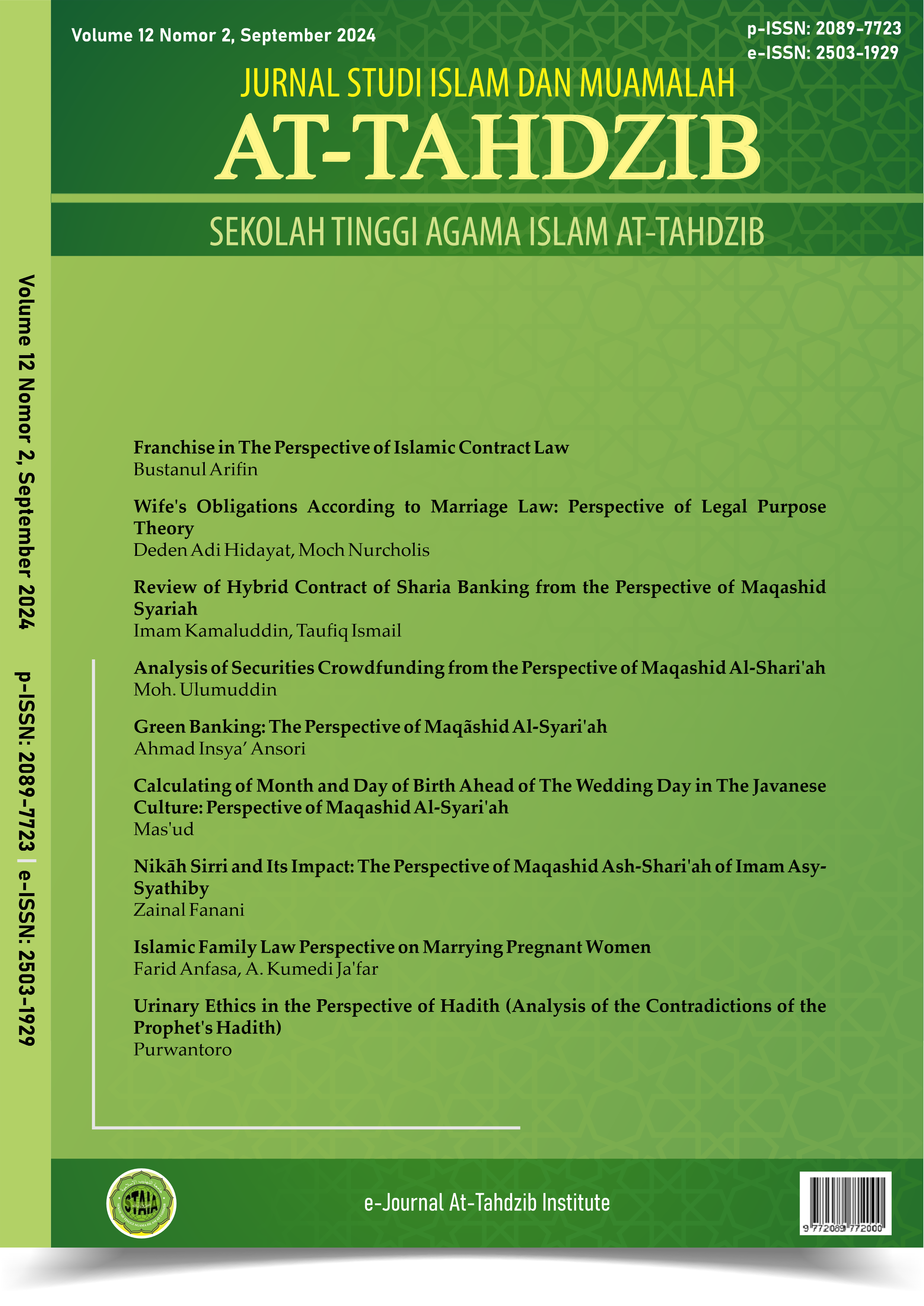Franchise in The Perspective of Islamic Contract Law
DOI:
https://doi.org/10.61181/at-tahdzib.v12i2.361Keywords:
franchise, agreement, Islamic lawAbstract
Background. The construction of an agreement based on Islamic Law must fulfill the principles of mu’amalah, the pillars (rukun) and conditions for the validity of the agreement, the provisions of the agreement and the prohibition of cooperating in committing a sin, and the ability of the parties to carry out legal acts. The valid condition of an aqad (agreement) is that the purpose of the agreement is fulfilled as the main consequence of an aqad.
Aims. This article examines franchise business agreements according to the normative provisions of Islamic Law.
Methods. Library research studies emphasize the legal aspects of franchises. Conceptual data are tracked on the internet with the keywords franchise and Islamic perspective and the results are analyzed descriptively.
Results. Franchise is a form of cooperation agreement (syirkah) which provides special rights and authorities to the franchisee as the recipient. Franchise is a reciprocal agreement, because the franchisor as the franchiser and the franchisee, both are obliged to fulfill certain achievements. Franchise agreements are permitted according to Islamic Law because they are beneficial and do not contain elements that conflict with the concept and process of syirkah and fulfill the pillars of ijarah: ‘uqud (people who have aqad, namely the franchisor and franchisee), sighat ‘uqud (found during negotiations), ujrah (wages), and benefits (business).
References
Ali, Mohammad Daud. (1991). Asas-asas Hukum Islam: Hukum Islam I : Pengantar ilmu Hukum dan Tata Hukum Islam di Indonesia. Jakarta: Rajawali Pers.
al-Ghazali, Abu Hâmid Muhammad. (1417). al-Mustasfa min ‘Ilm al-Ushul. Beirut: Mu’assasat al-Risâlah.
al-Jassas, Abi Bakar Ahmad Ar-Razi. (1993). Beirut: Ahkam al-Qur’an.
al-Zarqa, Musthofa. (1968). Al-Fiqh al-Islami fi Sahihi al-Jadid. Damaskus: Matabi’ Alifba ‘al-Adib.
Anshori, Abdul Ghofur. (2010). Hukum Perjanjian Islam di Indonesia: Konsep, Regulasi, dan Implementasi. Cet. 1. Yogyakarta: Gadjah Mada University Press.
Anwar, Syamsul. Hukum Perjanjian Syariah : Studi Tentang Teori Akad dalam Fikih Muamalat. Jakarta: Raja Grafindo Persada, t.t.
Azzam, Abdul Aziz Muhammad. (2010). Fiqh Muamalat: Sistem Transaksi dalam Fiqh Islam. Jakarta: Amzah.
Djazuli, A. (2016), Kaidah-kaidah Fikih. Jakarta: Kencana.Firdawaty, Linda. (2011). Perjanjian Waralaba Menurut Hukum Islam. Asas : Jurnal Hukum Ekonomi Syariah, 3, 1, https://doi.org/10.24042/asas.v3i1.1652.
Ghufron, Moh Idil, dan Inas Fahmiyah. (2019). Konsep Waralaba Perspektif Ekonomi Islam. Amwaluna: Jurnal Ekonomi dan Keuangan Syariah 3, 133–48. https://doi.org/10.29313/amwaluna.v3i1.4287.
Harun. (2011). Bisnis Waralaba di Indonesia Perspektif Hukum Islam (Tinjauan Hukum Muamalat). http://publikasiilmiah.ums.ac.id/handle/11617/2264.
Hernoko, Agus Yudha. (2010). Hukum Perjanjian Asas Proporsionalitas dalam Kontrak Komersial. Edisi Pertama. Jakarta: Kencana.
Ibn Hazm. al-Muhalla. Beirut: al-Maktab al-Tijari, t.t.
Ibnu Taimiyyah. (1980). Majmu’ al Fatawa. Beirut: Dar Al-Fikr.
Jamil, Fathrrahman. Hukum Perjanjian Syariah dalam Kompilasi Hukum Perikatan. Bandung: Citra Aditya Bakti, t.t.
Salim, HS dan Muhaimin. (2018). Tehnik Pembuatan Akta Akad Pembiayaan Syari’ah. Depok: Raja Grafindo Persada.
Kaʾbah, Rifyal. (1999). Hukum Islam di Indonesia: perspektif Muhammadiyah dan NU. Cet. 1. Jakarta: Universitas Yarsi.
Kementerian Agama. (2012). Al-Qur’an dan Tafsirnya. Bandung: Sinergi Pustaka Indonesia.
Mardani. (2012). Fiqh Ekonomi Syariah: Fiqh Muamalah. Ed. 1., cet. 1. Jakarta: Kencana.
Marshall, Catherine, dan Gretchen B. Rossman. (2016). Designing Qualitative Research. 6rd. California: Sage.
Meleong, Lexy J. (1989). Metodologi Penelitian Kualitatif. Bandung: Remaja Rosdakarya.
Miles, Matthew B., A. M. Huberman, & Johnny Saldaña. (2014). Qualitative data Analysis: A Methods Sourcebook. 3rd. Califorinia: Sage Publications.
Muhammad, Abdulkadir. (1990). Hukum Perikatan. Bandung: Citra Aditiya Bakti.
Mustofa (2017). Franchise in Islamic Law Perspectives. Al-Mizan 13, 2, 121–39. https://doi.org/10.30603/am.v13i2.738.
Subekti, R. (1987). Hukum Perjanjian. Jakarta: Intermasa.
Sugeng. (2019). Legal Protection for Recipients of Foreign Franchise Rights In Indonesia. Indonesia Law Review 9, 2. https://doi.org/10.15742/ilrev.v9n2.530.
Suhendi, Hendi. (2007). Fiqh Mumalah: Membahas Ekonomi Islam Kedudukan Harta, Hak Milik, Jual Beli, Bunga Bank dan Riba, Musyarakah, Ijarah, Mudayanah, Koperasi, Asuransi, Etika Bisnis dan Lain-lain. Cet. V. Jakarta: Raja Grafindo Persada.
Sutedi, Adrian. (2008). Hukum Waralaba. Cet. 1. Ciawi, Bogor: Ghalia Indonesia.
Tutik, Titik Triwulan. (2008). Hukum Perdata dalam Sistem Hukum Nasional. Ed. 1., cet. 1. Jakarta: Kencana.
Wibowo, Agung Satryo, Rommy Hardyansah, Didit Darmawan, Rio Saputra, dan Dharma Setiawan Negara. “Legal Protection and Justice for Franchise Business Operators from an Islamic Law Perspective.” Journal of Ecohumanism 3, no. 6 (3 September 2024): 27–40. https://doi.org/10.62754/joe.v3i6.3892.
Yunus, Mahmud. Kamus Arab Indonesia. Jakarta: Mahmud Yunus, t.t.
Yusdani. (2002). Transaksi (Akad) dalam Perspektif Hukum Islam. Millah: Journal of Religious Studies, 71–84.
Downloads
Published
Issue
Section
License
Copyright (c) 2024 Bustanul Arifin

This work is licensed under a Creative Commons Attribution 4.0 International License.




